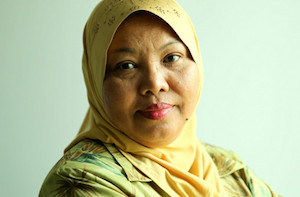Can Amanah break away from the common dominant race-based politics?
Zubaidah Abu Bakar, The Rakyat Post
THE scene at the swanky IDCC Convention Centre in Shah Alam where the official launching of Parti Amanah Negara or Amanah was taking place on Wednesday was in stark contrast to the Red Shirt Rally participated by Malay groups in the heart of Kuala Lumpur.
Here, the crowd was multi-racial although the Malays were still the dominating group. Amanah is the new kid of the block, it is a multi-racial party which will end up like all other political parties in Malaysia whose membership is multi-ethnic —- but with one single race dominating them.
For Amanah, it will be the Malays solely because the party is committed to its Islamic agenda. It is hard to fathom the idea of the non-Muslims, with choices in abundance from the list of multi-ethnic parties available, easily hopping onto a vehicle that is taking the Islamic route in chasing for an electoral mandate.
Not that this cannot happen; we had seen non-Malays latching themselves to Islamist party Pas, which is 100% Malay-centric.
Even so, the non-Malays are only accepted as associate members and they do not have voting power nor able to hold key positions in the party.
Non-Malays may have equal rights in Amanah but then again, when the majority of members are of one ethnic group, it is unlikely the ones who are not with the majority group would stand a good chance of being elected.
Even Parti Keadilan Rakyat that was formed to introduce non-race-based politics has a long way to go to truly reflect a multi-race entity.
In every internal election, PKR retained the Malay flavour for the simple reason that the Malays make up the most number of voting delegates.
The same goes to DAP, the Chinese dominated party which is still struggling to open up to more non-Chinese.
DAP failed to get its mostly Chinese delegates to vote in more Malay leaders for key party positions while the number of its Indian members and leaders remains small.
On the Barisan Nasional side, there are several parties with a multi-racial composition, but in
reality Gerakan and SUPP, for instance, are Chinese-based while the People’s Progressive Party (PPP) has Indians as a majority of its members.
The Liberal Democratic Party (LDP), Parti Bersatu Sabah (PBS), Parti Pesaka Bumiputera Bersatu (PBB), Parti Bersatu Rakyat Sabah (PBRS), Sarawak Progressive Democratic Party (SPDP), Parti Rakyat Sarawak(PRS) and United Pasokmomogun Kadazandusun Murut Organisation (Upko) — are also ethnic-based and who gets to hold senior party positions also depended to the dominant race in each party.
Amanah as announced by its secretary-general, Anuar Tahir has 30,000 members, mostly from Kelantan followed by Johor and Selangor.
Anuar did not give a proper breakdown based on ethnicity at the Amanah launching but it is clear as daylight that the majority of the party’s members are former Pas members and supporters, a result of Amanah being spearheaded by progressive leaders, who had left Pas after they were defeated in the latter’s internal polls.
As Amanah strives to increase its membership to 100,000 by the end of the year, more focus perhaps should be on wooing the non-Malays to reflect its multi-race image.
A country with a multi-racial population like Malaysia, ideally, should do away with race-based political parties, which over the years are glaringly becoming a setback to the country’s unity, a situation that Amanah says it is out to correct.
It will be interesting to watch how Amanah will manoeuvre between upholding Islam and at the same time remain inclusive.
The party leaders know this will not be easy.


